
A member of the cher public who attended last night’s premiere of Verdi’s Macbeth at the Opéra national de Paris filed this report:
It was Paris Opera GM Gerard Mortier‘s penultimate opportunity – his term ends in July – Â to moon opening night Parisian audiences and he did just that. He flew in bad-boy director Dmitri Tchernlakov from an opera house in Novosibirsk, Russia, to wreak havoc on Verdi’s Macbeth.
Before the overture, we see a ugly town square where someone shows up in a backpack, drawing people from the surrounding buildings who shout a welcome. During the overture, we see projected images of Google Earth circling a town; ironically, Â it was Google Earth I was using earlier in an unsuccessful attempt to locate Novosibirsk. We float down to a lifeless house and look through window at a plain room with a happily flaming gas fireplace.
Clueless stage direction rule number one: when crowds drink, never put a table for the empty glasses. Macbeth set his on a chair and later, when he has his banquet mad scene the couple managed their rough-housing while holding champagne goblets. The departing crowd had to place their goblets precariously on the various chairs when leaving.
Lady M. appears, inexplicably, with a top hat during her mad scene. The Soviet-style pants suit she was given was credited to the director but resembled rather the fashion house of Hormel. Macduff sings his sole aria in a wooden playpen complete with toys. Men are wearing ill-fitting Kruschev-era cheap suits. The costumes for the crowds are 20th Century Refugee. They could have brought the entire lot at the Salvation Army store for $375 but, as the costume shop made them, you can add three or four zeros to the cost. The witches were judged expendable as were the assassins of Banquo – roles assumed by the shabby crowd.
The chorus, although unannounced, was apparently on strike (or the variation the French call service minimum) the first half, singing mezza voce, and make only a little more effort later. You could count on the
fingers of one hand when they entered on the beat – and, remember, the chorus plays a key role in this opera.
The conductor, Teodor Currentzis, was standing on every phone book in the building, partially obstructing the view of anyone with orchestra seats. He managed to convince the lazy orchestra, however, that he actually was 10 feet tall and they played like the polished ensemble they could be but never are. If you can imagine a young John Cleese doing his out-of-control conductor bit, you can come close to the fun I had watching him in action. The good news: he stirred the orchestra into such a pitch, they drowned out most of the singing.
Just as well. Our Macbeth was Dimitris Tiliakos whose approximate Italian, raspy voice and limp delivery was uncomfortable to watch and hear. His wife, Violeta Urmana, took about a half-hour to find the right key but even then sang with an painful edge. Clearly theatrically challenged, she was awkward from first to last and obviously was getting no help from the stage director. There was not a single gesture by anyone this night that seemed real.
Ferruccio Furlanetto‘s Banquo sounded shopworn but fortunately his character is dispatched early. Stefano Secco, a well-known tenor in this house, was the parka-wearing Macduff. His new rafter-raising voice, winning large applause for his only aria, had regulars speculating that he was miked.
The production dispenses with the action which ends the opera – the director couldn’t be further bothered. We seen Macbeth alone on stage encouraging the audience to fight while the backstage chorus, well-amplified, reply. The celebratory chorus ending the opera, one of the most stirring Verdi every wrote, is sung offstage as we leave the building and float back up to Google heaven. It was Verdi drained of meaning, passion, truth and purpose. The ones who disemboweled this early masterwork were roundly booed at the curtain but Mortier somewhere was certainly smiling.














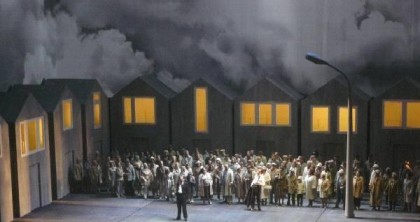
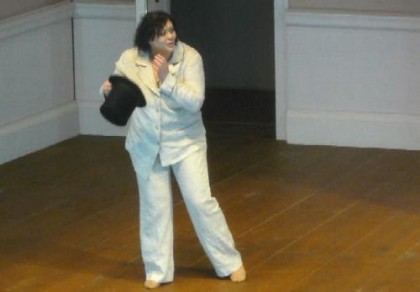
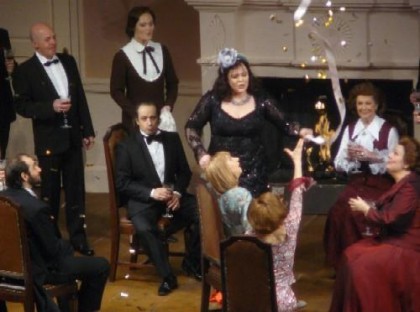
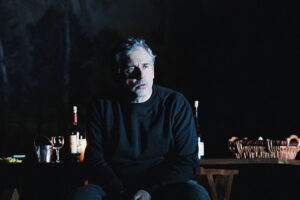
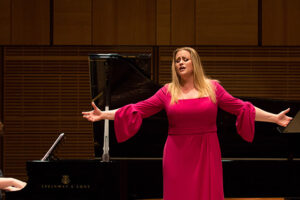
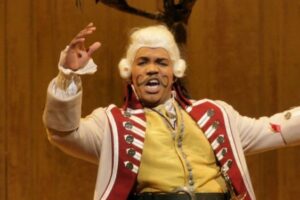
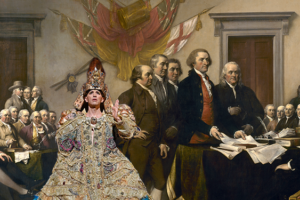





Comments